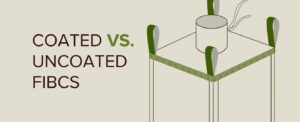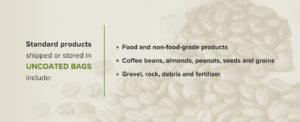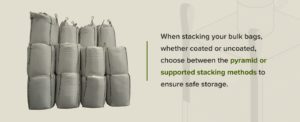
From pharmaceutical and food purposes to chemical and agricultural industries, FIBCs — flexible intermediate bulk containers — are ideal for transportation and storage of various materials. At Midwestern Bag & Supply, we manufacture our bulk bags out of flexible, woven polypropylene strands to support warehouses, manufacturing facilities and construction sites. Depending on the product at hand, you have the option to choose between coated and uncoated FIBCs to fit each of your situations.
Here’s what you need to know about coated vs. uncoated FIBCs and how to determine which solution is ideal for your business.
What Are Coated FBICs, and When Can You Use Them?
What are coated bulk bags? Coated FIBCs have a similar construction to a standard bulk bag. Also called a laminated or non-breathable fabric, coated solutions have an additional polypropylene — PP — layer added to the fabric before being sewn together. The extra film seals any small gaps within the poly weaves to prevent products like fine powders from sticking to the weave when removed.
The polypropylene can apply to the inside or outside of the bag. However, application to the inside is the most common. The easiest way for you to know if a FIBC has a PP coating is to see if the weave spreads apart. You will have to test both the inside and outside to determine if there is an extra layer of polypropylene.
The advantage of working with coated bags means you receive extra protection for your stored and transported materials. Many FIBCs withstand harsher environments where dirt, dust and moisture are present. The PP coating protects the products from outside atmospheres and creates excellent moisture control. Coated bags reduce the breathability of a bag, shielding it from contamination.
Typical uses of coated FIBCs include:
- Transporting dry and free-flowing products that are often in granule, powder, flake or crystal form
- Salt, flour and detergents
- Fine minerals like sand, carbon black and sugar
- Milled corn, soy powders, chemicals, glass and steel
If you don’t invest in a coated FIBC, you run the risk of products seeping through the bag.
What Are Uncoated FIBCs, and What Are Some Common Uses?
Now, what are uncoated bulk bags? The uncoated fabric promotes air and moisture flow, allowing both to pass through the woven material. Uncoated FIBCs are ideal for products that need breathability. In general, for particle sizes that exceed 120 microns, an uncoated bag is your best bet.

Standard products shipped or stored in uncoated bags include:
- Food and non-food-grade products
- Coffee beans, almonds, peanuts, seeds and grains
- Gravel, rock, debris and fertilizer
For storing anything smaller than 120 microns, use a bag liner or coated interior FIBC.
How to Choose Between Coated and Uncoated FIBCs
Details matter when it comes to choosing the right FIBC for your situation. You will want to consider components such as the size of the bag, fabric type, weight, coated vs. uncoated, liners, etc. When determining between coated and uncoated bulk bags, it comes down to the specific product you’re working with and its application.
If you’re concerned about the material’s exposure to moisture and air, focus on coated fabrics. Coated fabric protects the content from seeping through the FIBC, while uncoated allows air and moisture to pass through the weaves. If powders are fine, they can pass through an uncoated bag as well.
Several aspects you will want to consider when choosing between coated and uncoated FIBCs are as follows:
- What material is going into the bags?
- What is the bulk density of the product?
- Are you working with hazardous chemicals?
- Are you using fine or coarse materials?
- What market are you in? Chemical, construction, pharmaceutical?
- Do you require a unique barrier?
- What’s the moisture percentage of your product?
- What are some characteristics of the material — free-flowing, static buildup, bridging?
You will want to invest in the bulk bag that maximizes your performance levels while minimizing the cost. The weight of the FIBC fabric correlates to how much product the bag can hold. For example, the heavier the container, the more product it can withstand.
Further FIBC Information
Both coated and uncoated bags have lift loops, stevedore straps, single-point lifts or sleeves. FBICs, transported via forklifts, hoists and cranes, also have four different design pattern options available — U-panel, circular, four-panel and baffle. Bulk bags even have protection from prolonged exposure to UV rays to safeguard your products.

You can use bulk bags more than once within a closed-loop system. In other words, you must clean, recondition and use the FIBC to work with the same material and application as the original. When stacking your bulk bags, whether coated or uncoated, choose between the pyramid or supported stacking methods to ensure safe storage.
In 2016, the chemical industry alone purchased about 166 million units of FIBCs. The food industry spent money on about 127 million bulk containers that year, and the pharmaceutical sector invested in about 96 million FIBCs. Other industries in the survey bought close to 211 units of bulk bags in 2016.
According to Technavio’s global FIBC market research, the bulk bag market will grow at a compound annual growth rate of more than 6%. One major trend in the FIBC market between 2018 and 2022 will be the push for more sustainability. Analysts also predict a key driver in the bulk bag sector will stem from advancements in the construction industry.
Our Comprehensive Packaging Solutions
Experts at Midwestern Bag & Supply are here to support you in narrowing down an exact choice between coated vs. uncoated FIBCs. We strive to give personal attention, whether you’re in the agricultural or construction sector searching for bulk container orders. Midwestern Bag & Supply offers superior services based on your needs and service area. We meet stringent safety standards and can also create custom pieces from our facilities throughout the nation.
As a leading supplier of FIBCs, we deliver top-performing coated and uncoated bags. Reach out to us online for further information or request a quote to learn about your options.


 Copyright © 2024 Midwestern Bag. All Rights Reserved.
Copyright © 2024 Midwestern Bag. All Rights Reserved.